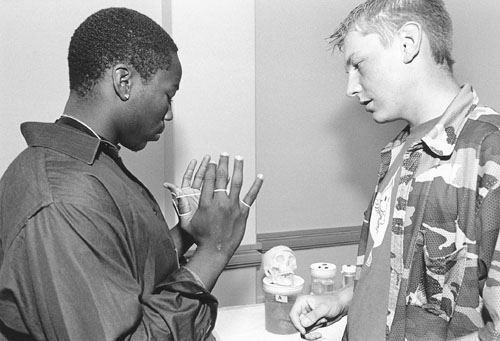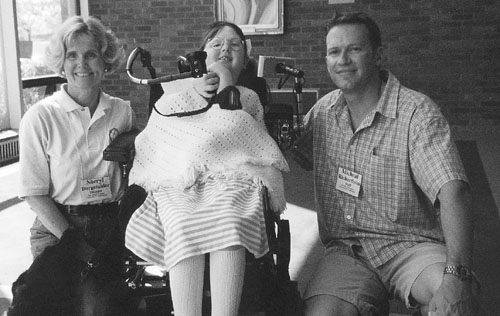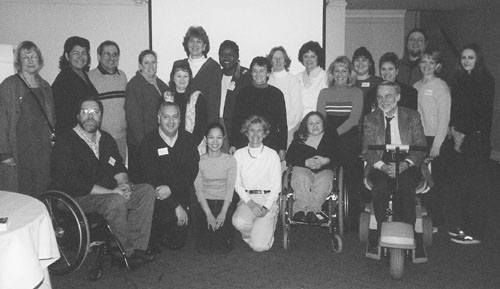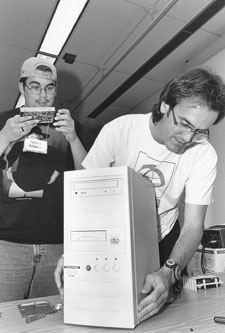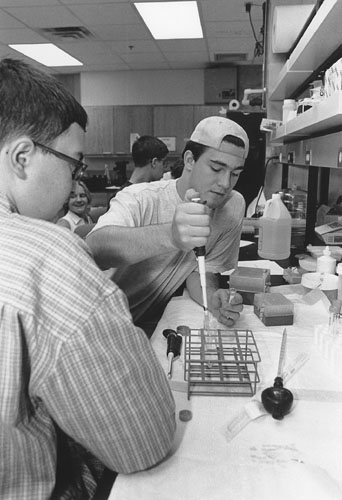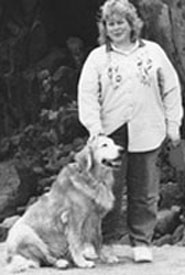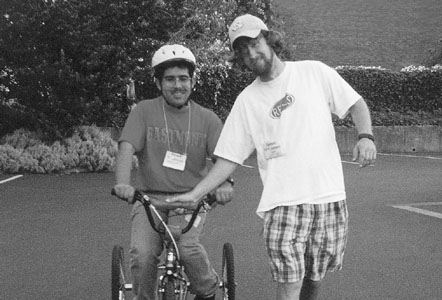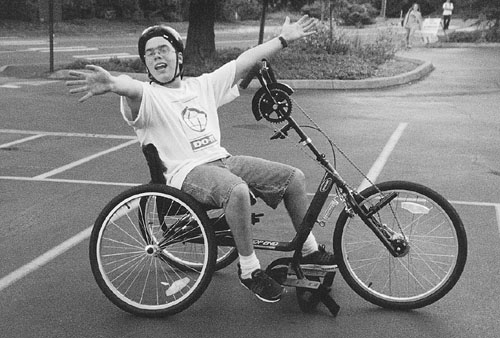Director's Digressions
Meet the 2001 Scholars
The ninth annual DO-IT Summer Study program for high school students with disabilities took place in August. Twenty new DO-IT Scholars are funded by the State of Washington, three Washington Scholars are funded by the Boeing Company and one Florida Scholar, Jacob, is funded by NASA.
Jacob joins us from Gulf Breeze, Florida. He likes math, but his favorite subject is zoology because he likes studying and working with animals. He wants to go to college and major in zoology and minor in botany and veterinary medicine. After college he wants to work as a zoologist. Jacob, who has attention deficit hyperactivity disorder, is in the school band and won an award for both his solo and ensemble performances.
Brad is from Sammamish. He enjoys studying math and science in school and hopes to obtain a Master's degree in either subject someday. His career goals include becoming a mathematical or scientific researcher. Brad has Attention Deficit Disorder and a learning disability.
Brandi's favorite courses are Language Arts and Earth Science. To achieve her career goals in veterinary medicine and creative writing she hopes to attend Gallaudet University in Washington, D.C. Brandi, who comes to us from Enumclaw, has a hearing impairment.
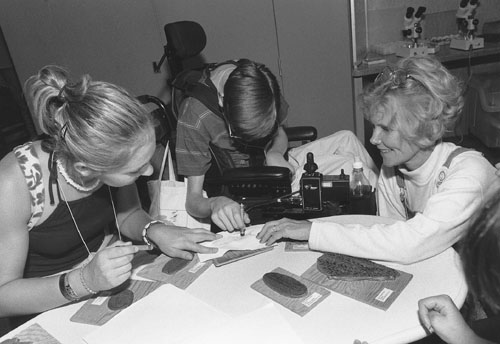
Chris has won many academic awards and honors including the Gold Medal of Achievement and the District Outstanding Student Award. He participates in many extra-curricular activities including student council (he is the student body treasurer), the D.A.R.E. Program, and FCF Wilderness, and has also found time to letter in football as a team statistician. His favorite course is math. Chris, who has muscular dystrophy, comes from Kelso.
Trisha enjoys history and math. She hopes to go to college to be an education major with an endorsement in special education. She wants to minor in history. Trisha, who has a learning disability, is a member of the National Honor Society and has been on the honor roll. She has also lettered in cheerleading at White Swan High in her hometown of White Swan.
Alexandra wants to go to a four-year college after she graduates from high school in Sumner. She says that being deaf, "doesn't really effect my learning." She enjoys using technology to correspond with her friends.
Sarah is from Redmond. She has received academic honors including Awards for Scholastic Excellence two years in a row. Her favorite academic subjects are English and Spanish and she hopes to become an interpreter in a hospital one day. She also enjoys Shakespeare and mythology. Sarah has a mobility impairment called fibrodysplasia ossificans progressiva.
Steven loves math "because it is very logical." His educational goal is to go to college and get a Master's degree in architecture. He plays wheelchair basketball and enjoys golf, swimming and skiing.
Matt grew up on a ranch and has his own small flock of sheep. He has started raising money for his college education by selling his most outstanding lambs to other FFA and 4-H kids for local livestock shows. He wants to go to a four-year college and earn a degree in business management. After college, he plans to work in the family business. Matt, who has a learning disability, comes from Goldendale, WA and counts Natural Resources and Construction Tech among his favorite subjects.
Caleb plans to start off at a two-year college and then transfer to a 4-year university. His favorite subjects are global studies and science but he wants to pursue a career in computers or electronics. Caleb, who is blind, comes from Bow and enjoys "communicating with other high school students with disabilities to see what their goals are and what they are doing to achieve them."
Brandon plans on "at least four years of college" in computer software engineering. His career goal is to be a computer programmer and someday design video games. In school he enjoys math and computers and wants to learn about HTML and Web design. Brandon, who is quadriplegic, is from Seattle.
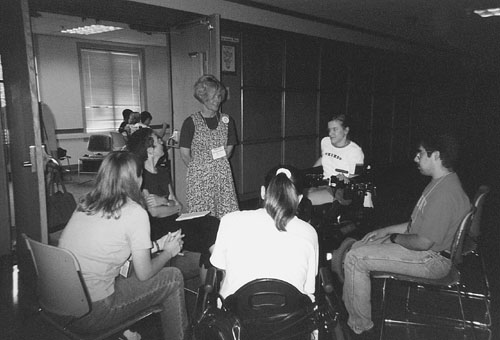
Matthew hopes to pursue a career in computer animation in the entertainment industry and, to that end, plans to attend college on the West Coast, preferably UCLA. His favorite subjects are science and computers. Matthew, who has muscular dystrophy, comes from Vancouver.
Alicia enjoys English and U.S. history. She likes to read and write. She wants to go to college after she graduates from high school. Her career goal is to become a teacher, a psychologist, or a social worker. Alicia, who has a learning disability, has been on the honor roll twice and has earned a varsity letter in track. She comes from Toppenish.
Amy, who has cerebral palsy, comes from Snohomish. She is on the honor roll at her school. Her favorite classes are English and math. After high school, she would like to go to college to study business. Amy wants to have a career where she can help others, possibly as a social worker or an elementary school teacher.
Michael would like to work for a software company someday writing computer games. His favorite subjects in school are math and Japanese. He plans to go to college and get a degree in computer science. Michael, who has Asperger syndrome, is from Shoreline.
Elizabeth likes to meet other college-bound students with disabilities. Her favorite subjects are English and history. She has been writing short stories and poetry since she was very little. She has contributed essays and articles to several local newspapers and magazines, and has already won several academic awards. Elizabeth, who has cerebral palsy, wants to go to a community college and then transfer to a university. She joins us from Shelton.
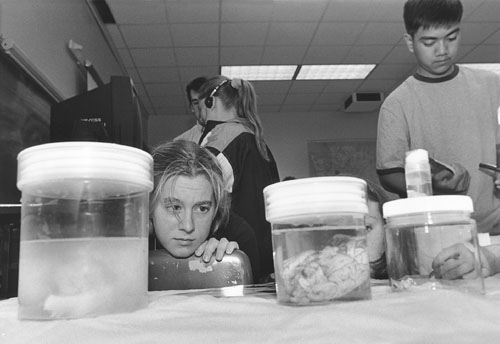
Brandon enjoys English and his career goals include becoming an English teacher. Brandon also enjoys studying Spanish. He wants to go to the University of Washington after high school. Brandon comes from Kent.
Jeff isn't sure yet what he wants to do as a career. He enjoys math and computer programming. He sees computer programming as an art form because "it's a good way to express what's in my heart." He wants to go to a four-year college to study math or computer science, and then plans to go to graduate school. Jeff, who has attention deficit hyperactivity disorder and dyslexia, is from Pullman.
Raechell is from Woodinville. She enjoys studying math and business law in school because they are "interesting" and "important to know in every day life." Her educational goal is to go to college and study teaching so that she can become an elementary school teacher.
Lauren would like to pursue a health career. She plans on attending a community college and then transferring to a university. She enjoys e-mailing and talking with her friends and shopping at the mall. Lauren, who has neurofibromatosis, comes from Issaquah.
Chris is interested in computer-aided drafting and other engineering occupations. He plays football in the fall, wrestles in the winter, and works as an umpire in the spring. His favorite subjects are English and history. Chris, who has attention deficit disorder, plans to become a lawyer, history teacher, or a police officer. He joins us from Aberdeen.
